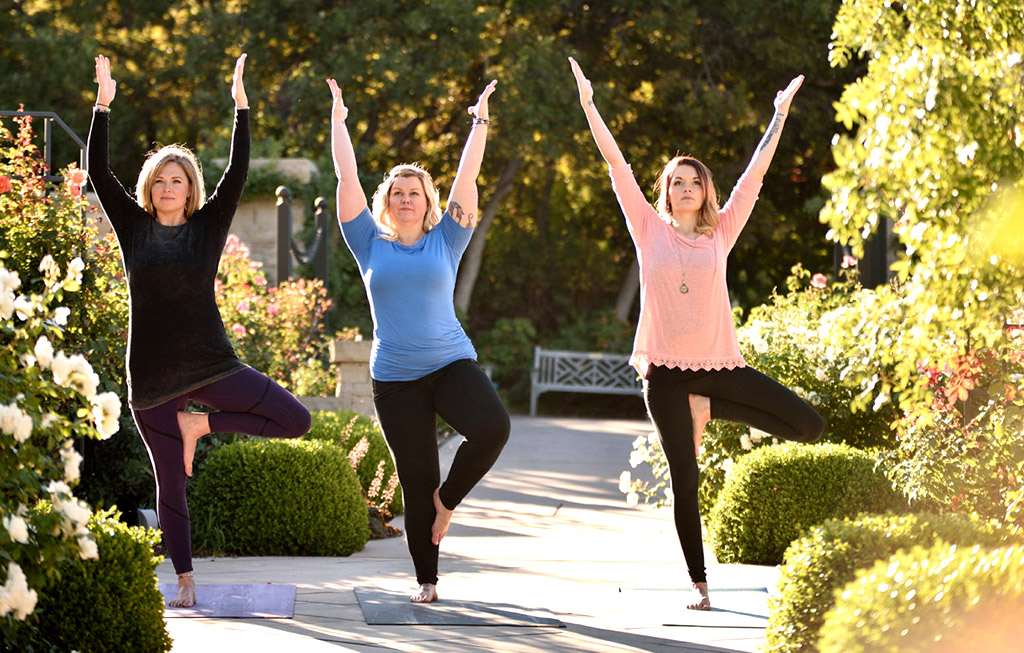
What motivates you to practice yoga and/or meditation? Why go to the trouble to attend a class or two each week? We’re all busy, and yet, most of us who practice yoga and meditation find time to practice. That practice doesn’t have to take hours out of our day. We can benefit from as little as five minutes of a mindful practice. When we realize this—the benefits of devoting some time to practice each day—we develop an inner fire. That fire, called tapas in Sanskrit, keeps us going to the mat.
Tapas is the third of the niyamas, the second of the Eight Limbs of Yoga. While there’s no direct translation of the word to English, its meaning includes a combination of inner fire, enthusiasm, discipline, simplicity and commitment. Tapas is what inspires us to practice. And it’s a self-fulfilling energy.
Tapas is a Self-Fulfilling Practice
Many of us rebel against the idea of discipline. The word is fraught, often conjuring visions of a rough taskmaster whipping us into shape. But the word “discipline” actually comes from the Latin root word meaning “to learn.” Learning is what we do when we commit to a practice. We learn not only about whatever it is that we’re practicing, but we also learn about how to balance our approach to practice.
Tapas not only inspires us to practice yoga or meditation, but it also helps us define the path we want to take. When our path comes into focus, we can begin to let go of the habits and practices that don’t support our vision. So tapas is a discipline of balancing our lives so that we invest our resources wisely. Then we’re able to funnel our energies into those things that support the direction we’d like to take.
In my book, Mindful Yoga, Mindful Life, I wrote about the self-fulfilling practice of tapas:
“I’ve found tapas to be a meld of discipline, simplicity, mindfulness and enthusiasm. With discipline, we steadily feed our aspirations. As our practice grows, extraneous, unsupportive distractions fall away. Our lives become simpler. Simplicity brings our lives into sharper focus, which allows us to invest our consciousness more mindfully to our tasks. Mindfulness generates insight, energy and enthusiasm, which renew our resolve to practice.”
How to Balance Your Effort
My meditation teacher, Pujari Keays, talks a lot about balancing effort. He implores his students to be “not too tight, not too loose.” Another meditation teacher I’ve worked with quite a lot, Joseph Goldstein, puts it this way: “Be relaxed, but not casual.”
The tricky part of exploring tapas is learning how to balance our effort. When we take discipline too seriously, we can tend to become the taskmaster that invites rebellion. When we allow ourselves too much leeway, we can fall into a habit of skipping practice altogether.
Six years ago, I committed to practicing mindfulness for an hour a day. For the most part, I meet that commitment. But there are days when it’s not feasible to spend an hour on the cushion. On those days, I practice as long as I can, usually at least 30 minutes. I can do this without feeling guilty because I remember the bigger picture, that for the most part, I honor my 60-minute commitment. Because I’ve been practicing for so many years, since 1988, my inner taskmaster is not in charge of my practice anymore. I practice because I’ve seen the benefits, both in the moment and over time. The value of mindfulness is never in question. That trust in the practice develops over our years of engaging in tapas.
Sometimes, we do need to invoke the inner taskmaster. There are days when you may not feel like practicing. But often, if you just step onto your mat or cushion anyway, you’ll remember why you’ve chosen the practice in the first place.
How to Inspire Tapas
It’s helpful to reflect on the reasons we practice. In what ways has your yoga or meditation practice enhanced your life? Remembering the good can be a component of tapas practice. It reminds us of why we’ve chosen to practice in the first place.
The most powerful way to inspire tapas, though, is to practice. Here are some suggestions that might help you keep your commitment to practice:
- Commit to practicing each day, no matter what. Determine the amount of time you can commit to, whether it’s five minutes a day or an hour or more. Practicing for five minutes a day will help you develop a practice habit much more easily than practicing for an hour once a week. Of course, if you commit to five minutes a day, you can always practice longer if time permits.
- Determine a time for your practice. I’m not a morning person, but I’ve committed to an early morning practice simply because it’s too easy to be distracted later in the day. Make that time you set aside sacrosanct.
- Make it easy. Have your props available and easy to set up. If setting up your practice space is excessively inconvenient, you’ll be less likely to do it. You need not have a dedicated yoga room. Most of us don’t have space for that. I keep my meditation cushion set up in a little corner of my den. My yoga mat, bolsters, blankets and blocks are in a closet in the next room so that they’re easily accessible.
Like all the Eight Limbs of Yoga, tapas is a lifelong practice. The way we apply tapas to our practice will evolve over time. Sometimes the strategies we used in years past will no longer apply. Mindfulness is key. Pay attention to the process—your attitudes toward practice and what kind of effort is appropriate at a given time. And enjoy your journey.
